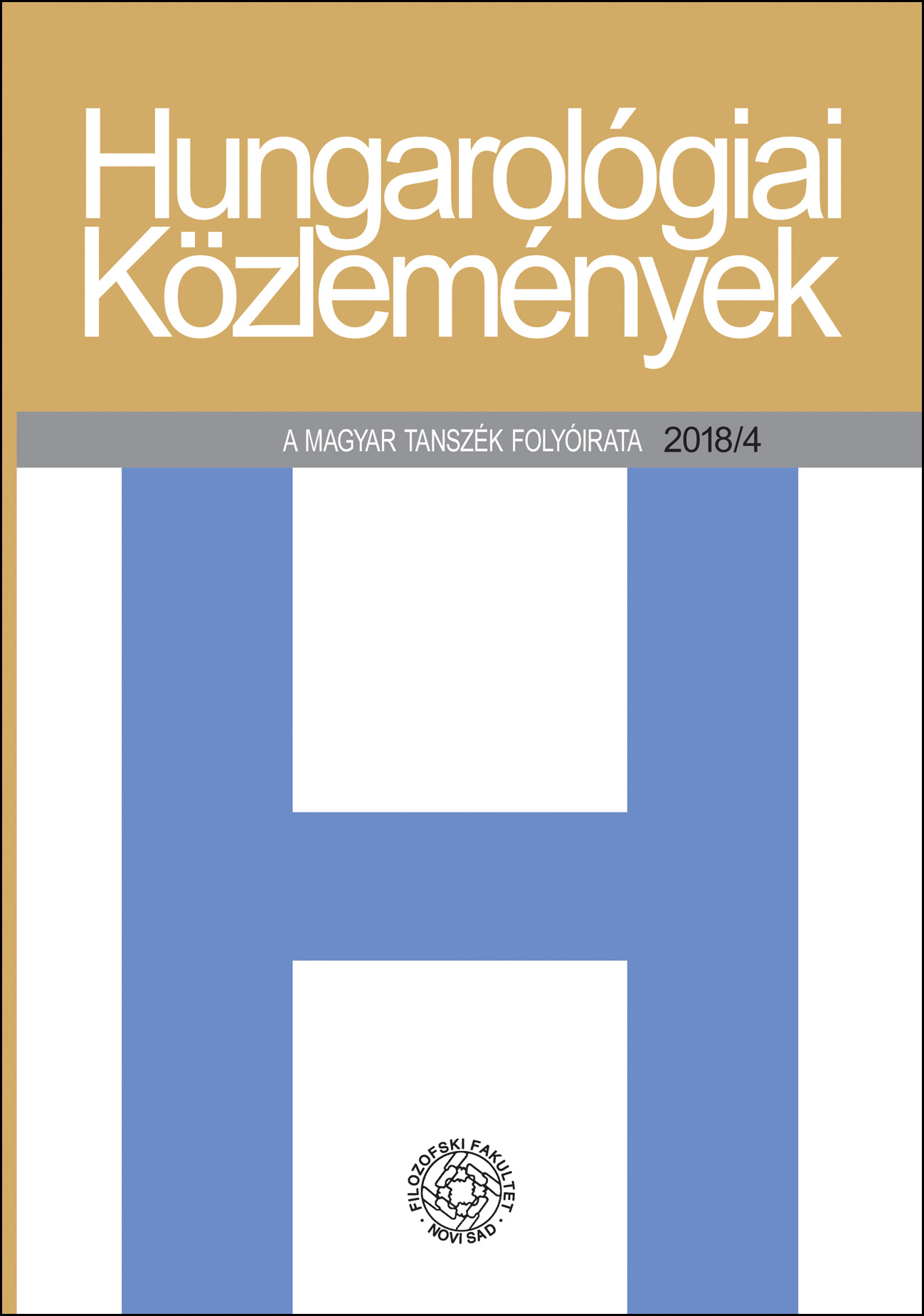A RÉSZVÉTNÉL IS MÉLYEBBRE
Absztrakt
A gondolatmenet Fejtő Ferenc önazonosság-keresésének, intellektuális tájékozódásának és politikai szimpátiáinak összefüggéseit vizsgálja. A szerző ama koncepciójának szellemi-kulturális körvonalait szemügyre véve, amelyben térségünk különleges regionális tagoltságú, huszadik századi metaforikus szerveződésként jelenik meg. Mégpedig a szerényebb méretekre és a gyengülő gazdasági hátterű függőségekre kárhoztatott nemzet(ség)i csoportosulások historikus örökségének konglomerátumaként. Kiemelt hangsúlyt kap az a fejtői sejtés, hogy a Josip Broz Titó-i vezérlésű és örökségű Jugoszlávia hatalomszervezési, nyelvi-retorikai mechanizmusai voltaképpen önmaguk nosztalgikus szimulációját hozták létre.
Hivatkozások
Ćurković-Major Franciska. 2002. Zágráb képe Fejtő Ferenc Érzelmes utazás című regényében. Tiszatáj, 56 (10): 77–87.
Denegri, Ješa. 2012. Modernizam/Avangarda: Ogledi o međuratnom modernizmu i istorijskim avangardama u jugoslovenskom umetničkom prostoru. Beograd: Službeni glasnik.
Fejtő Ferenc. 1957. Belgrádi levél. Irodalmi Ujság, aug.1. 2.
Fejtő Ferenc. 1961. Gyilasz szabadon. Irodalmi Ujság, febr. 3. 3.
Fejtő Ferenc. 1962. Gyilasz. Irodalmi Ujság, ápr. 15. 5.
Fejtő Ferenc. 1994. Nemzetek, kisebbségek, Európa. Ford. Osvát Anna. Európai Utas 5 (3): 14–15.
Fejtő Ferenc. 2001. A horvát–szerb megegyezés. Magyar Hírlap, jún. 8. 7.
Fejtő Ferenc. 2007. Budapesttől Párizsig – Párizstól Budapestig: Visszaemlékezések és beszélgetések. Ford. Balabán Péter. Budapest: Kossuth Kiadó.
Fejtő Ferenc. 2008. Érzelmes utazás. Harmadik, bővített kiadás. Budapest: Kossuth Kiadó.
Jančar, Drago. 1992. Emlékek Jugoszláviáról. Ford. Gállos Orsolya. In Az eltört korsó: Válogatás a legújabb szlovén esszéirodalomból. Ford. Gállos Orsolya, Reiman Judit. 111–138. Pécs: Jelenkor Irodalmi és Művészeti Kiadó.
Kérdések a Laibach csoportnak (A Rockerilla magazin nyomán). 2006. Ford. Domokos Tamás. In Extázis és agónia: Független zenei /h/arcterek. Fosszília (különszám) 7 (4), vál. és szerk. Virág Zoltán. Szeged: JABE a Hallgatókért Kiadói Alapítvány – POMPEJI Alapítvány.
Krleža, Miroslav. 1965. Agrami gyermekkorom 1902–1903. Ford. Ács Károly. In Uő: Versek, emlékiratok. Ford. Ács Károly, Csuka Zoltán. 231–293. Budapest: Európa Könyvkiadó.
Krleža, Miroslav. 1982. Napló 1958–1969 (részletek), vál. és ford. Túri Gábor. Híd 46 (7–8): 849–936.
Perica, Vjekoslav. 2002. Balkan Idols: Religion and Nationalism in Yugoslav States. New York: Oxford University Press.
Sokcsevits Dénes. 2011. Horvátország a 7. századtól napjainkig. Budapest: Mundus Novus Kft.
Suvin, Darko. 2016. Splendour, Misery, and Possibilities: An X-Ray of Socialist Yugoslavia. Leiden–Boston: Brill.
Tamás István. 1927. 5 világrész a Szajna partján. Subotica: Minerva Rt.
Unkovski-Korica, Vladimir. 2016. The Economic Struggle for Power in Tito’s Yugoslavia: From World War II to Non-Alignment. London–New York: I. B. Tauris & Co. Ltd.
Velikonja, Mitja 2014. New Yugoslavism in Contemporary Popular Music in Slovenia. Trans. Olga Vuković. In Post-Yugoslavia: New Cultural and Critical Perspectives, eds. Dino Abazović, Mitja Velikonja. 57–95. Basingstoke: Palgrave Macmillan.
Velikonja, Mitja. 2015. Mapping Nostalgia for Tito: From Commemoration to Activism. In Welcome to the Desert of Post-Socialism: Radical Politics After Yugoslavia, eds. Srećko Horvat, Igor Štiks, London–New York: Verso Press.








